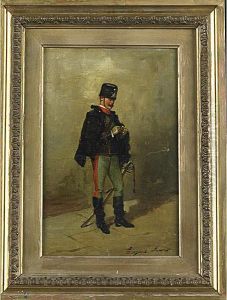Eugenio Baroni Paintings
Eugenio Baroni was an Italian sculptor and engraver, born in Rome in 1888. His work is often associated with the monumental and commemorative style that was prevalent in Italy during the early 20th century, particularly under the Fascist regime. Baroni's artistic journey is reflective of the era's complex interplay between art, politics, and society, showcasing a blend of classical tradition and modernist innovation.
Baroni's education and early career were marked by his engagement with traditional sculptural techniques and the influence of the Italian Renaissance, which were foundational to his development as an artist. However, as Italy underwent significant political and social changes, so too did Baroni's work evolve to reflect the ideologies and aesthetics of his time. Notably, his sculptures and public monuments often embodied the Fascist regime's ideals of strength, unity, and national pride, utilizing heroic and classical motifs to convey these themes.
Despite the political overtones in some of his work, Baroni's artistic merit and contribution to Italian sculpture cannot be overlooked. His skill in manipulating materials such as bronze and marble to capture both the idealized forms of classical antiquity and the dynamic expression of modern life is evident across his oeuvre. Among his notable works are monuments and memorials that still stand in various parts of Italy, serving as reminders of both Italy's cultural heritage and its historical complexities.
Baroni's career was cut short by his untimely death in 1939, at the age of 51. However, his legacy lives on through his sculptures, which continue to be studied and admired for their technical prowess and aesthetic beauty. Through his work, Eugenio Baroni remains a significant figure in the history of Italian art, embodying the tumultuous yet creative spirit of the early 20th century.
